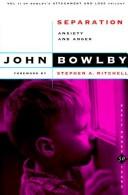
Separation
By John Bowlby
Subjects: Grief, Fear in children, Behavior, Child development, Mother and child, Child psychology, Personality development, Grief in children, Deprivation (Psychology), Divorce, Separation (Psychology), Maternal deprivation, Personality Development, Child Behavior, Bereavement, Attachment behavior in children, Psychological aspects, Separation anxiety in children, Personality, Bereavement in children, Angst, Mother-Child Relations, Moeder-kind-relaties, Anxiety in children, Separatieangst, Loss (Psychology) in children, Adjustment (Psychology) in children, Child mental health, Attachment behavior, Psychoanalytic Theory, Emotional problems of children, Maternal Deprivation, Marriage counseling, Pathological Psychology, Instinct, Separation Anxiety, Emotions in children
Description: Provides a comprehensive report on the mother-child bond and the emotional effects of and behavioral response to maternal deprivation. A young child when removed from his mother and placed with strangers is distressed; subsequently he often becomes despairing and, later still, detached. There is evidence that reactions of this kind may underlie much psychopathology. In these volumes, John Bowlby, a pioneer in the field, considers the implications of these observations for psychoanalytic theory. Volume 1, Attachment, is devoted to an analysis of the nature of the child's tie to his mother. An examination of instinctive behavior leads to a theoretical formulation of attachment behavior- how it develops, how it is maintained, and what function it fulfills. Volume 2, Separation, will apply this theoretical scheme to the problems of separation anxiety and grief and the pathological forms they often assume. Volume 3, Loss, develops the study into consideration of mourning, depression, and defensive processes. The research contained in this volume set is based on years of observation and study, and is a pioneering work on several counts. Not only is it the most ambitious and exhaustive study of the subject ever undertaken, it also embodies a departure in psychoanalytic investigation. From Freud onwards, most analysts have worked from an existing condition backward to an earlier development. Dr. Bowlby here extrapolates forward from potentially pathogenic events to illuminate the pathways of the developing personality.
Comments
You must log in to leave comments.